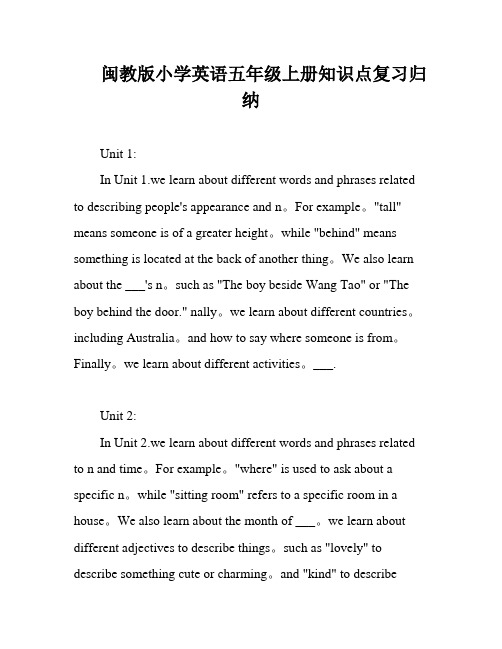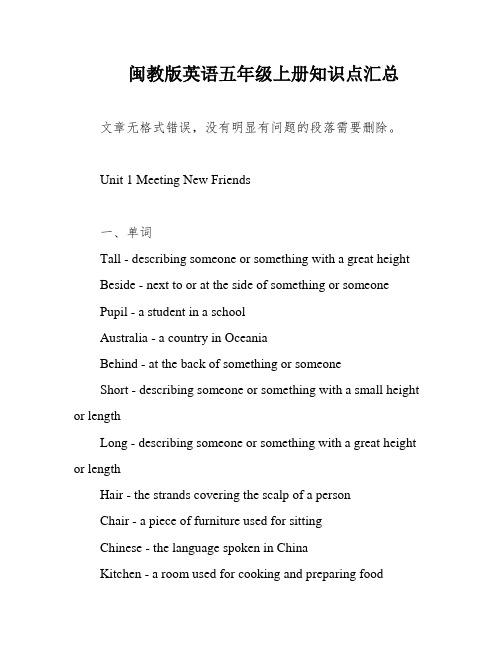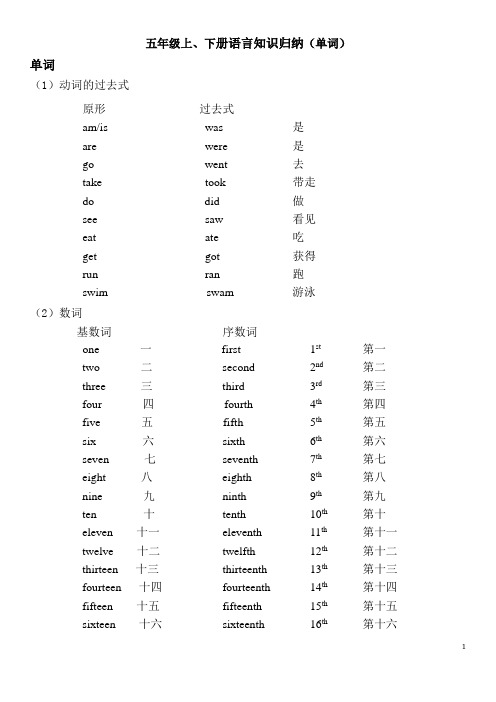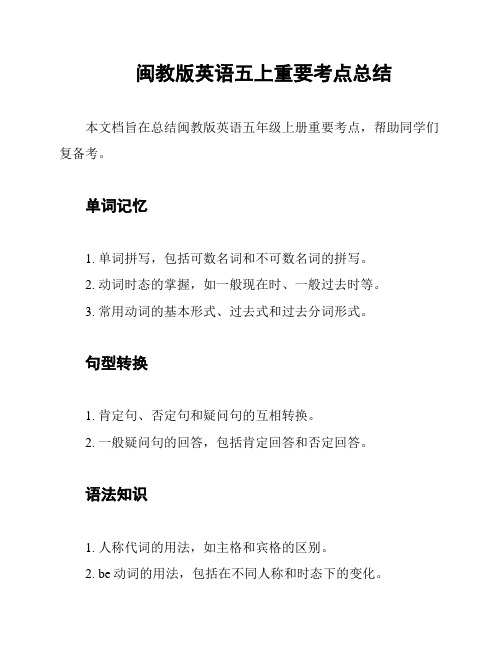闽教版小学英语五年级上册知识点
教材全解(知识清单)闽教版英语五年级上册

考点汇编闽教英语五年级上册Unit 1 Meeting New Friends认识新朋友Name:Class:Number:一、词汇:(背诵+默写+听写)tall 高的pu/pil 小学生short 短的;矮的hair 头发be/side 在...的旁边Aus/tra/lia 澳大利亚be/hind 在...的后面long 长的记单词的方法:1.熟词法:先找出之前学过的单词,例如:hand手,可以分解:hand(和)。
2.字母组合法:找出学过的字母组合。
ee字母组合:feet脚(复数)3.音节切分法(1)单词由什么构成?音节。
(2)音节数=元音数。
(3)单词分为①单音节词(一个元音)cat②双音节词(两个元音)panda③多音节词(三个及以上元)banana(4)单词拆分三步法:①从后往前找。
②找元音,组合放一起。
③分辅音,一个归后,两个分开。
④一元一辅切。
(拼读音)例如,family (family)3个音节。
blackboard(blackboard) 2个音节。
二、短语:(背诵+默写+听写)in Grade Five 在五年级 a new pupil 一名新小学生be good at 擅长play basketball 打篮球play the violin 拉小提琴in white 穿着白色的衣服behind the door在门的后面on the bike 骑自行车with a basketball 带着一个篮球long hair 长头发short hair短头发三、重点句型(背诵+默写+听写)1. Who’s that boy? 那个男孩是谁?2. Which boy? 哪个男孩?3. The tall boy beside Wang Tao. 王涛旁边的那个高个子男孩。
4. He’s very good at sports. 他非常擅长体育运动。
5. He is from Australia. 他来自于澳大利亚。
闽教版小学英语五年级上册知识点复习归纳

闽教版小学英语五年级上册知识点复习归纳Unit 1:In Unit 1.we learn about different words and phrases related to describing people's appearance and n。
For example。
"tall" means someone is of a greater height。
while "behind" means something is located at the back of another thing。
We also learn about the ___'s n。
such as "The boy beside Wang Tao" or "The boy behind the door." nally。
we learn about different countries。
including Australia。
and how to say where someone is from。
Finally。
we learn about different activities。
___.Unit 2:In Unit 2.we learn about different words and phrases related to n and time。
For example。
"where" is used to ask about a specific n。
while "sitting room" refers to a specific room in a house。
We also learn about the month of ___。
we learn about different adjectives to describe things。
闽教版英语五年级上册知识点汇总

闽教版英语五年级上册知识点汇总文章无格式错误,没有明显有问题的段落需要删除。
Unit 1 Meeting New Friends一、单词Tall - describing someone or something with a great heightBeside - next to or at the side of something or someonePupil - a student in a schoolAustralia - a country in OceaniaBehind - at the back of something or someoneShort - describing someone or something with a small height or lengthLong - describing someone or something with a great height or lengthHair - the strands covering the scalp of a personChair - a piece of furniture used for sittingChinese - the language spoken in ChinaKitchen - a room used for cooking and preparing foodWatch TV - to view n programs二、词语Beside Wang Tao - next to or at the side of Wang Tao In Grade Five - studying in the fifth gradeThat boy - referring to a specific boyThe tall boy - referring to a boy with a great heightA new pupil - a student who recently joined the school Be from Australia - to come from AustraliaBe good at - to have a talent or skill in doing something On the bike - riding a bicycleBehind the door - at the back of the doorWith a basketball - holding a basketballBe good at sports - to have a talent or skill in sports With short hair - having short hairWith an umbrella - holding an umbrellaPlay basketball - to participate in a basketball game Play the lin - to perform on a linIn white - wearing white clothing三、重点句型、语法1.Who’s that boy。
新闽教版小学英语五年级知识点归纳

五年级上、下册语言知识归纳(单词)单词(1)动词的过去式原形过去式am/is was 是are were 是go went 去take took 带走do did 做see saw 看见eat ate 吃get got 获得run ran 跑swim swam 游泳(2)数词基数词序数词one 一first 1st第一two 二second 2nd第二three 三third 3rd第三four 四fourth 4th第四five 五fifth 5th第五six 六 sixth 6th第六seven 七 seventh 7th第七eight 八eighth 8th第八nine 九 ninth 9th第九ten 十 tenth 10th第十eleven 十一eleventh 11th第十一twelve 十二 twelfth 12th第十二thirteen 十三thirteenth 13th第十三fourteen 十四 fourteenth 14th第十四fifteen 十五fifteenth 15th第十五sixteen 十六 sixteenth 16th第十六seventeen 十七s eventeenth 17th第十七eighteen 十八eighteenth 18th第十八nineteen 十九nineteenth 19th第十九twenty 二十 twentieth 20th第二十(3)月份January 一月February 二月March 三月April 四月May 五月June 六月July 七月August 八月September 九月October十月November 十一月December 十二月(4)表情的形容词proud 自豪的sad 难过的tired 疲倦的angry 生气的happy 高兴的hungry 饥饿的lucky 幸运的thirsty 渴的(5)名词parent 父,母;家长hometown 故乡lake 湖elephant 大象hill 小山map 地图animal 动物garden 花园water 水camera 照相机sky 天空cloud 云floor 楼层bridge 桥date 日期meter 米race 赛跑river 河Mrs. 夫人,太太drawing 画calendar 日历people 人,人们tour 旅行;旅游mountain 山grass 草program 节日building 建筑物neighbor 邻居flower 花paper 纸glasses 眼镜taxi 出租车mobile 手机phone 照片picture 照片,图画classmate 同班同学panda 熊猫pupil 小学生uncle 叔叔,伯伯month 月份man 男人(6)动词color 上颜色hide 藏climb 攀爬try 尝试drink 喝smile 微笑guess 猜cook 烹调shout 喊叫write写(7)形容词tall 高的short 矮的long hair 长头发short hair 短头发young年轻的lovely 可爱的(8)介词In 在…..里面on在……上面beside 在……旁边Behind 在……后面(9)地点词sitting room 客厅museum 博物馆cinema 电影院train station 火车站hospital 医院City Library 市图书馆bus stop 公交车站(10)其他under 在......下面brown 棕色的fast 快b usy 忙的only 仅仅 also 也difficult 困难的before 在......之前(11)专有名词Sun Moon Lake 日月潭Easter Bunny 复活节兔子Sports Day 运动会China 中国Easter 复活节the Great Wall 长城National Day 国庆节Australia 澳大利亚the USA 美国Teachers’ Day 教师节(12)短语look for 寻找pick up 捡起long jump 跳远high jump 跳高living room 客厅play basketball 打篮球over there 在那边next to 紧挨着get on 上车fall down 跌倒;跌下cheer up 振作起来watch a film 看电影play football 踢足球take a photo 照相draw a picture 画画play chess 下象棋go straight 直着走turn right 向右转turn left 向左转turn on 打开sit down 坐下put on 戴上重点句型1)How was your winter vacation ? 你的寒假过得怎样?It was wonderful. I visited the Great Wall. 太棒了。
闽教版英语五年级上册知识点汇总

闽教版英语五年级上册复习重点Unit1Meeting New Friends一、单词tall 高的 beside在......的旁边 pupil 小学生Australia 澳大利亚 behind 在......的后面 short 矮的、短的 long长的 hair头发 watch TV看电视二、词语beside Wang Tao 在王涛旁边 in Grade Five 在五年级 be good at 擅长做某事 on the bike 在自行车上 behind the door 在门后 with a basketball 拿着一个篮球 be good at sports 擅长运动 with short hair 短发的 with an umbrella 带着一把雨伞play basketball 打篮球 play the violin 拉小提琴 in white 穿着白色的衣服三、重点句型1.-----Who’s that boy ? 那个男孩是谁?-----Which boy ? 哪个男孩?-----The tall boy beside Wang Tao.王涛旁边的那个高个子男孩。
-----That’s Peter. 那是彼得。
Unit 2 Teachers’ Day一、单词where 哪里 sitting room 客厅 panda熊猫 September 九月Teacher’ Day 教师节 flower 花,花朵 paper纸 picture 图片 smile 微笑 photo照片二、短语draw a picture 画一幅画 September 10th 九月十日 behind the tree 在树后 near the window 在窗户附近 make paper flowers 做纸花 for you 给你 take a photo 拍一张照片 Happy Teachers’Day 教师节快乐 read a book 看书In the sitting room 在客厅a lovely panda 一只可爱的熊猫 give it to Miss Gao 把它给高老师三、重点句型1、 -- Where is the boy/girl? 那个男孩/女孩在哪?-- He/She is + 地点他/她在......-- Where are the boys/girls ?那些男孩/女孩在哪?-- They are + 地点他们在......询问某人正在做什么:---What’s he doing ?.他正在干什么?---He’s drawing a panda。
闽教版英语五上重要考点总结

闽教版英语五上重要考点总结
本文档旨在总结闽教版英语五年级上册重要考点,帮助同学们复备考。
单词记忆
1. 单词拼写,包括可数名词和不可数名词的拼写。
2. 动词时态的掌握,如一般现在时、一般过去时等。
3. 常用动词的基本形式、过去式和过去分词形式。
句型转换
1. 肯定句、否定句和疑问句的互相转换。
2. 一般疑问句的回答,包括肯定回答和否定回答。
语法知识
1. 人称代词的用法,如主格和宾格的区别。
2. be动词的用法,包括在不同人称和时态下的变化。
3. 一般现在时的应用场景,如描述经常发生的事情。
4. 一般过去时的应用场景,如过去发生的事件。
阅读理解
1. 抓住关键词,理解文章主旨。
2. 根据语境推测词义。
3. 根据文章内容回答问题,理解细节信息。
4. 根据文章意思,完成相关练。
听力理解
1. 训练听力,提高听懂对话和短文的能力。
2. 根据听到的内容回答问题,理解细节信息。
3. 根据对话和短文的意思,完成相关练。
书面表达
1. 用自己的语言描述图片或短文内容。
2. 根据题目要求进行写作,表达清晰准确。
以上是五年级上册的重要考点总结,同学们在复备考过程中可以参考本文档进行针对性复,提升英语研究水平。
祝同学们考试顺利!
(800字)。
闽教版五年级上英语词汇和句型知识汇总
闽教版小学英语五年级上册词汇与句型知识点汇总Unite 1一、单词、词组1.just now 刚才2.buy a schoolbag 买一个书包3.a T-shirt 一件体恤4.a story book 一本故事书5.in the bookstore 在书店6.in the supermarket 在超市7.a pencil-case 一个铅笔盒 8.at home 在家9.my favorite color 我最喜欢的颜色 10.a nice bag 一个漂亮的书包11.go to the supermarket 去了超市 12.a ruler 一把尺子13. a pen 一支钢笔 14.three pencils 三支钢笔二、句子1.Were you in the supermarket?你在超市吗? Yes,I was. 是的,我在。
2.I bought a schoolbag. 我买了一个书包。
3.Where did you go yesterday? 你昨天去哪里了?I went to the supermarket. 我去了超市。
(bookstore 书店/fruit store水果店/zoo 动物园/park公园)Unite 2一、单词、词组1.have a good time 过得愉快2.in England 在英国3.visit Big Ben 参观大本钟4.take some photos 照了一些照片5.so big 很大6.visit the Great Wall 参观长城7.play basketball 打篮球 8. do the homework 做家庭作业9.do housework 做家务 10.in your summer vacation 在你的暑假11.from the USA 来自美国 12. a new student 一个新的学生13.play the piano 弹钢琴 14.swim in the sea二、句子1.Did you have a good time in England? 你在英国过得愉快吗?Yes,I did. 是的。
闽教版英语五年级上册知识点汇总
闽教版英语五年级上册复习重点Unit1Meeting New Friends一、单词tall 高的 beside在......的旁边 pupil 小学生 Australia 澳大利亚 behind 在......的后面 short 矮的、短的 long长的 hair头发 chair椅子 Chinese 语文kitchen厨房 watch TV看电视二、词语beside Wang Tao 在王涛旁边in Grade Five在五年级 that boy 那个男孩the tall boy 那个高男孩 a new pupil 一个新的小学生be from Australia 来自澳大利亚be good at擅长做某事on the bike 在自行车上 behind the door 在门后with a basketball拿着一个篮球be good at sports 擅长运动with short hair 短发的with an umbrella 带着一把雨伞 play basketball打篮球play the violin拉小提琴in white 穿着白色的衣服三、重点句型、语法1.Who’s that boy?那个男孩是谁? Which boy?那个男孩?The boy beside/behind/with/in...... 那个在....的旁边/在...的后面/带...(特征)/穿...衣服/在...地方(考点:选择题、连词成句)询问及说明新朋友情况的句型:1.-----Who’s the boy ? 那个男孩是谁?-----Which boy ? 哪个男孩?------The tall boy beside Wang Tao. 王涛旁边的那个高个子男孩。
------That’s Peter. 那是彼得。
The boy beside Wang Tao. 那个王涛旁边的男孩。
(人名前面不加the , a )The boy beside the door. 那个门后面的男孩。
考点汇总(知识清单)闽教版英语五年级上册
闽教英语五年级上册in Grade Five 在五年级 a new pupil 一名新小学生be good at 擅长play basketball 打篮球play the violin 拉小提琴in white 穿着白色的衣服behind the door在门的后面on the bike 骑自行车with a basketball 带着一个篮球long hair 长头发short hair短头发1. Who’s that boy? 那个男孩是谁?2. Which boy? 哪个男孩?3. The tall boy beside Wang Tao. 王涛旁边的那个高个子男孩。
4. He’s very good at sports. 他非常擅长体育运动。
5. He is from Australia. 他来自于澳大利亚。
6. The girl with short hair. 短头发的女孩。
7. e and play basketball with us. 来和我们一起打篮球把。
8. But I like to watch you play. 但是我喜欢看你们打篮球。
9. We’re in Grade Five now. 我们现在五年级了。
1.ch / tʃ/ chair Chinese2.tch / tʃ/ kitchen watch TV(1)in在…里面例:in the bag 在书包里(2)on在…上面例:on the chair 在椅子上(3)under在…下面例:under the desk在书桌下面(4)near 在…附近例:near the window 在窗户附近(5)beside 在….旁边例:beside Lily 在Lily旁边(6)behind 在…后面例:behind the door在门后be动词就是:is, am, are , 意思:“是”。
I我;you你,你们;he他,she她,it它(备注:father相当于he; Sally相当于she; dog相当于it。
闽教版英语五年级上册知识要点(1-8单元)
五年级英语上册知识点总结(1--8单元)Unit1一、词组in Grade Five在五年级from+国家:来自……国家be good at:擅长……beside Wantao:在王涛的旁边a new pupil一个新学生on the bike:骑在自行车上behind the door:在门后with a basketball:拿着一个篮球in+颜色:穿……颜色的衣服with a basketball拿着一个篮球with short hair有短头发二、句子:e and play basketball with us.(和我们一起打篮球吧。
)2.I like to watch you play.我喜欢看你玩。
Unit2一、词组in the sitting room在客厅behind the tree在那棵树的后面near the window在那扇窗的附近in the classroom在教室里draw a panda画一只熊猫a lovely panda一只可爱的熊猫read a book看一本书make paper flowers制作纸花10th第10my new drawing我的新画作Happy Teachers’Day教师节快乐a nice picture一幅漂亮的画give...to...把......给......say...to...对......说......for you给你take a photo拍照二、句型/句子:this(单数)these(复数)This is new drawing.These are English books.(单用is,复用are)Unit3一、词组National Day国庆节go for a holiday去度假live in Taibei住在台北go with me和我去by+交通工具:乘坐……交通工具turn on打开电源turn off关闭电源go by plane坐飞机Tell...about...告诉......关于......二、句子:Please tell me about it.请告诉我更多事情。
- 1、下载文档前请自行甄别文档内容的完整性,平台不提供额外的编辑、内容补充、找答案等附加服务。
- 2、"仅部分预览"的文档,不可在线预览部分如存在完整性等问题,可反馈申请退款(可完整预览的文档不适用该条件!)。
- 3、如文档侵犯您的权益,请联系客服反馈,我们会尽快为您处理(人工客服工作时间:9:00-18:30)。
闽教版小学英语五年级上册知识点Unit 1单词,词组tall 高的beside 在……的旁边pupil 小学生Australia 澳大利亚behind 在……的后面Short 短的;矮的long 长的hair 头发be good at……擅长做……例句:Lily is good at math. But I am not good at it.重点句型,语法。
Who’s that boy?那个男孩是谁?Which boy?哪个男孩?The boy beside/behind/with/in……那个在……的旁边/在……的后面/带……(特征)/穿……衣服/在……地方例句: The boy beside Wang Tao.那个王涛旁边的男孩.The boy behind the door.那个门后面的男孩。
The boy with red hair.那个红头发的男孩。
The boy with a basketball. 那个带篮球的男孩。
The boy in red. 穿红色衣服的男孩。
He’ s from Australia. 他来自澳大利亚。
He is from Taiwan.他来自台湾。
He is a new pupil. He’s a new pupil.他是新来的小学生。
play basketball 打篮球play the violin 拉小提琴We are in Grade Five now.我们是五年级。
that 和thosethat + 单数名词Look at that monkey.those +复数名词Look at those monkeys.Come and play basketball with us.来跟我们一起打篮球吧。
I like to watch you play.我喜欢看你们打篮球。
watch + 动词原形Unit 2单词,词组where 哪里sitting room 客厅lovely 可爱的panda 熊猫September 九月tomorrow 明天Teachers’ Day 教师节kind 亲切的;和蔼的near 附近flower 花;花朵paper 纸picture 照片;图画photo 照片smile 微笑take a photo 拍一张照片重点句型,语法where is Yang Ming? (杨明在哪里?)He’s in the sitting room.(他在客厅里)what’s he doing?(他在做什么)He’s drawing a picture.( 他正在画画)Where are the girls? (女孩们在哪里?)They are near the window. (她们在窗户附近。
)What are they doing? (她们在干什么?)They are reading a book.(她们在读书。
)Where 特殊疑问句询问地点。
例句:Where are the girls ? Where is my pen ? Where are my books?注意主语与谓语动词一致,主语girls 谓语用are,(复数),主语my pen 谓语用is (单数)。
现在进行时结构:Be (am, is, are) + 动词ing形式注意动词ing形式变化:直接加ing, going, doing, drawing去掉结尾e 加ing , ride, riding, dance dancing,双写结尾字母加ing, running,swimming,sitting, getting,月份第一个字母大写,SeptemberSay “ Happy Teachers’ Day” to her, please. (请向她祝贺教师节快乐)Say goodbye to (向某人说再见)this 和these (这和这些)this 这,单数,these 这些,复数形式注意谓语动词,this is, these are,例句:Who is this girl ? ( 这个女孩是谁?)These flowers are beautiful.(这些花真漂亮.)This is a new drawing. (这是一幅新画。
)It’s for Miss Gao. (它是给高老师的。
)These are English books. (这些是英语书)They’re for Grade Three. (它们是给3年级的)These are paper flowers. 这些是纸花。
It ’s /They are presents for you. 它/它们是给你的礼物。
Unit 3单词,词组National Day 国庆节holiday 假日uncle 叔叔;伯伯won’t = will not 将不tell 告诉about 关于July 七月August 八月October 十月there 那里turn on 打开find 找到;发现thing 东西Internet 因特网do one’s homework 做家庭作业重点句型,语法National Day is coming.(国庆节就要到了。
)Will you go for a holiday? (你会去度假吗?)will+动词原形表一般将来时,表示将要发生的动作。
Where will you go ? (你将去哪儿?)一般将来时的特殊疑问句。
I’ll go to Taiwan.(我将去台湾。
)Will you go by plane ? (你将乘飞机去吗?)一般将来时的一般疑问句。
No, I won’t. I’ll go by ship.(不,我不乘飞机。
我将乘船去。
)简短否定回答:No, I won’t.完整回答:No, I won’t go by plane.简短肯定回答:Yes, I will.When do you do your homework ? (你什么时候做家庭作业?)How is the weather in Taiwan ? (台湾的天气怎么样?)询问某地的天气,please tell me about it.(请告诉我吧。
)告诉某人某事常用tell somebody about something 来表达例句:Can you tell me about the meeting ? (你能告诉我会议的情况吗?)So it’s nice to go there in October. (因此在10月份去那儿旅游很好。
)so 表示因果关系,意思为“所以”,“因此”。
Why not turn on the computer? (为什么不打开电脑?)Why not do sth? 表示询问某人为何不做某事,有建议的含义。
why not 后面接动词原形。
Unit 4单词,词组cinema 电影院sit down 坐下put on 戴上glasses 眼镜film 电影afraid 害怕welcome 欢迎museum 博物馆cook 烹调player 球员chess 象棋play chess 下象棋come on 来吧go to the cinema = go to see a film 去看电影重点句型,语法。
Sit down, kids. Put on your glasses. We’ll watch a 3D film. (孩子们坐下来,戴上眼镜。
我们准备观看3D影片。
)put on 戴上,穿上,衣服等。
glass 解释为玻璃时时不可数名词。
解释为玻璃杯为可数名词。
解释为眼镜时,因为有2个镜片,所以要用复数形式。
Watch 观看,用于看电视,看比赛。
Don’t be afraid. (不要害怕。
)祈使句Welcome to the Science Museum. (欢迎来到科学博物馆。
)Welcome to my home.(欢迎来到我家。
)I can cook. (我会烹调。
)can 情态动词,后面跟动词原形。
Can you play chess ? (你会下象棋吗?)chess 不能加the.I go to the Science Museum on Sunday. I can play chess. (星期天我去科学博物馆。
我可以下象棋。
)Unit 5单词,词组April 四月March 三月June 六月May 五月month 月份December 十二月January 一月easy 容易的remember 记住November 十一月February 二月go skating 去滑冰go boating 去划船go swimming 去游泳,go shopping 去购物重点句型,语法When is your birthday? (你的生日是什么时候的?)It’s in spring. (在春天。
)In March. 在三月。
On Children’s Day. (在儿童节那天。
)特指在哪一天用介词on. That’s wonderful! (那太好了!)wonderful 的意思是“极好的”“令人惊奇的”“奇妙的”或“精彩的”。
如:The film is wonderful. (电影非常精彩。
)A day after New Year’s Day.(元旦之后的那一天。
)What’s your favorite month ? (你最喜欢的月份是什么?)That’s easy to remember. (那很好记。
)Unit 6单词,词组Excuse me. 请问/劳驾。
get to 到达station 车站far away 很远or 或者taxi 的士young 年轻的man (复数men)男人You’re welcome. 不用谢。
hospital 医院nearby 附近go straight 一直往前走turn 朝向;翻转right 右边的left 左边的bus stop 公交车站take a bus/taxi 坐公交车或出租车重点句型,语法Excuse me.(劳驾。
)How can I get to the train station ? (去火车站怎么走?)It’s far away. (火车站很远。
)You can take a bus or a taxi. (你可以乘坐公交车或出租车。
)get to+地点,get home 到家far away 很远。
I live far away from my school. 我住的地方离学校很远。
take bus/taxi 与by bus/taxi区别一个是句中,一个是句尾。
